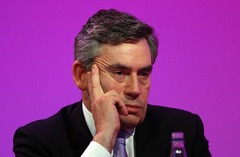“For those who held high hopes for the premiership of Gordon Brown, who endured the long wait through the Blair years nurturing the belief that something better beckoned, these are testing times”. Columns by two of Britain’s most astute political commentators will not improve Gordon Brown’s mood this morning. In The Guardian, Jonathan Freedland bemoans how Brown doesn’t get the vision thing. He starts by saying,
Columns by two of Britain’s most astute political commentators will not improve Gordon Brown’s mood this morning. In The Guardian, Jonathan Freedland bemoans how Brown doesn’t get the vision thing. He starts by saying,
Freedland goes onto berate Brown’s team for being more interested in politicking than governing and for a conference speech that was long on populist measures but short on argument. He also makes the crucial point that Brown’s stumble has reinvigorated his internal critics: all those who said that Brown would not be a patch on Blair as PM can, following the events of the past fortnight, now say I told you so.
In The Daily Telegraph, Irwin Stelzer celebrates the fact that British voters now have a choice once more. The piece demonstrates just how effectively the new Tory policies on education and welfare have helped to restore the intellectual right’s faith in Cameron. (Interestingly enough Stelzer is actually opposed to their inheritance tax proposal on meritocratic grounds.)
It is hard to imagine a paragraph like this being written earlier in the summer,
As Brown prepares to face Cameron at PMQs for the first time since the election climb down he finds himself distinctly on the back foot. To borrow a phrase from John Prescott, the tectonic plates appear to be moving in British politics.“Cameron’s inclination is different: he would like to see parents choose the schools best suited to their children’s needs, and healthcare that responds to the demands and desires of individual patients. Unlike Brown, who offers certainty and a state that is prepared to take responsibility for the care and feeding of its citizens, Cameron offers a future in which individuals will have to take more responsibility for their own affairs and the nature of their communities. For people accustomed to the paternalistic policies of the past decade, that is the road less travelled. But it is the only one that represents real change, if that is what you are after.”







Comments